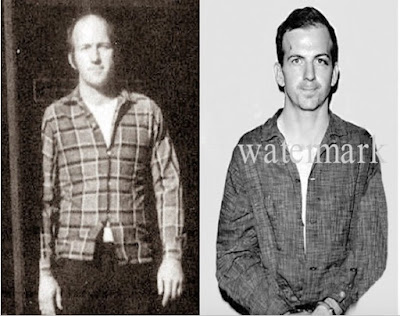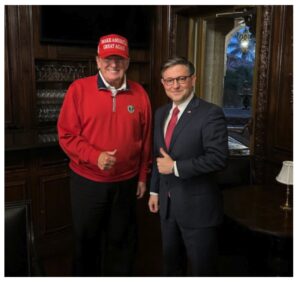by Jim Fetzer (with Judyth Vary Baker)
“[T]he shirt seen on the Doorway figure cannot be the shirt (in the Groden photographs) alleged to have been worn by Billy Lovelady “–Judyth Vary Baker
Among the most contentious issues in JFK research has been whether Lee Harvey Oswald, the alleged assassin of JFK, was caught in a famous photo taken by AP photographer James “Ike” Altgens in (what is known as) the Altgens6. The question is of enormous importance, since, if he was in the doorway at the time, he could not have been on the 6th floor shooting at JFK.
It therefore gives me great pleasure to report that the issue has been decisively settled by new research from Judyth Vary Baker. Lee not only cannot have been “the lone assassin”–he cannot even have been a shooter! He was innocent of the assassination of JFK. He said he was “the patsy” and that he had been in the doorway with Bill Shelly during the shooting, which has been proven–objectively and scientifically, through collaborative research–to be true.
My own research on the Altgens6 began when I discovered that the ARRB had released notes Will Fritz, the homicide detective who had interrogated him, had taken, during which Lee Oswald had told him he was “out with Bill Shelley in front”, which led me to take a closer look to see if he had been caught in the famous photo. Everything else that Lee had said after his arrest has proven to be true and I, like my colleagues, wanted to know whether that claim was, too.
When I discovered a collage on a John McAdams web site, where it was apparent that a face had been obfuscated, it was my initial inference that this had to have been Lee’s face, since there was no obvious reason to have removed that of anyone else. But I soon contacted by Ralph Cinque, who explained I had the right conclusion for the wrong reasons, an area in which he possessed considerable relevant expertise, given his background as a professional chiropractor in dealing with the bodies of men and with the fit of their clothing.
Ralph convinced me that the key to unraveling the ambiguity is their heights, their weights, their builds–which favor Oswald–and their clothing rather than their faces, where the shirt that Doorman is wearing is strikingly similar to the shirt that Lee was wearing when he was arrested. We would publish a series of sequels, which by now number around a dozen:
* we explained that Lovelady visited the FBI and showed them the shirt that he had been wearing, which was a red-and-white, vertically striped short-sleeved shirt;* that a man near the doorway in a checkered shirt, who has been claimed to have been Lovelady, has very different cranial and facial features and does not resemble him;
Just as we know the actual must be possible, we also know that the impossible cannot be actual. Since anyone can see that Doorman is missing his left shoulder and that Black Tie Man is both in front of him and behind him at the same time, I have become incredulous that any serious student of the assassination could deny that the Altgens6 has been altered. To adopt that stance would appear to require an agenda.
The HSCA assessment
The House Select Committee on Assassinations (HSCA) revisited the identity of the man in the doorway, where Altgens had stated that he took the picture of the presidential limousine, with the Texas School Book Depository entranceway in the background, just after he heard a noise “which sounded like the popping of a firecracker.” From experiments by Jim Lewis firing high-velocity bullets through windshields (The Great Zapruder Film Hoax (2003), p. 436), we know that the bullet that penetrated the windshield en route to its target made that sound, which fits the scenario perfectly. Thus, the HSCA wrote,
In evaluating the evidence that Oswald was in the sixth floor, southeast corner window of the Texas School Book Depository at the time of the shooting, the Warren Commission considered the allegation that the man shown in the doorway in the Altgens photograph was Oswald. The Commission concluded that the spectator was not Oswald, but rather another Texas School Book Depository employee, Billy Nolan Lovelady. This conclusion was based upon Lovelady’s identification of himself in the Altgens photograph and upon statements of other persons who were present in the Texas School Book Depository entranceway at the same time.
However, as Ralph Cinque has shown, the identification by Billy of himself was not as Doorman but as standing near him in the doorway area, which was cleverly misrepresented by Warren Commission Counsel, Joseph Ball, to convey the false impression of having identified himself as Doorman. The HSCA was also concerned about the clothing worn by Lee Oswald and by Billy Lovelady, especially since the FBI had photographed him in a red-and-white, vertically striped short-sleeved shirt:
This issue has also persisted because of reported discrepancies in connection with the clothing worn by the Altgens figure and Billy Lovelady on November 22, 1963. In media prints of the Altgens photograph, the man appears to be wearing a long-sleeved shirt similar to the one in which Oswald was arrested. According to a memo written by FBI Director J. Edgar Hoover 287 to the Warren Commission after Lovelady had been interviewed and photographed in 1964 by FBI agents, Lovelady was reported to have been wearing a short-sleeved red and white, vertically striped shirt. Lovelady later explained that when he was interviewed and photographed by the FBI, he had not been told to wear the same shirt he had worn on the day of the assassination and that, in fact, he had been wearing a long-sleeved, plaid shirt when he was standing in the Texas School Book Depository doorway.
These are images that are reported to have been used by Robert Groden, who is identified as a “freelance photographer” among the HSCA’s consultants, even though he would appear to have had no discernible credentials for assuming such an important task. Here are some of the images upon which he is said to have relied, which include images of Gorilla Man, in reaching his conclusion that Doorman’s shirt “in pattern and color” corresponded more closely to Lovelady’s checkered shirt than to Oswald’s tweed-patterned shirt, which turns out to be laden with irony:
This contradiction was partially resolved by photo-optical work performed by Robert Groden, a Warren Commission critic and photographic consultant to the committee.* During his work with the committee Groden made photographically enhanced enlargements of the original 35 millimeter black and white Altgens negative and frames of the Bell, Martin, and Hughes color motion picture films, which also showed the spectator in the doorway, and detected a pattern of lines that correspond in pattern and color more closely to Lovelady’s plaid shirt than to Oswald’s tweed-patterned shirt.* Groden initially was among those who claimed the Altgens photograph could not be of Lovelady. See note 249 supra.
The plot thickens
On pages 186-187 of The Killing of a President (1963), Robert Groden not only endorses Billy Lovelady as Doorman, but he asserts (beside the photos of Billy in a checkered shirt), “I interviewed Billy in 1976. Lovelady took out the shirt he had worn in Dealey Plaza (he had packed it away for safekeeping) and put it on for the first time in years”. But this was not the shirt that Billy had been wearing, which he had shown to the FBI when they requested that he come in with the shirt he wore on 22 November 1963:
Moreover, Groden asserts in the text, “When the FBI called Lovelady to come down and be photographed, they told him not to bother to wear same shirt. When they released the photographs, they stated that it was the same shirt, creating the controversy over whether it was Oswald or Lovelady in the Depository doorway”. But there would have been no point in photographing him in a shirt other than the one he had been wearing. The Director wanted to confirm he was the man in the doorway. Here is the report they sent to J. Edgar Hoover:
Checkered Shirt Man
Although Groden publishes profile photos of Checkered Shirt Man just above the FBI photos, he does not observe that they look nothing alike: Billy has an ordinary facial profile and normal cranium, while those of Checkered Shirt Man make him look like a gorilla! They are not remotely the same, which we have emphasized in many of our studies. Ralph consulted with nine experts, who unanimously agreed they were not the same man. Here is one of Richard Hooke’s collages, which makes the point so clearly that it is unreasonable to deny:
That a point is unreasonable to deny does not mean that otherwise reasonable people might not still deny it. A distinction must be drawn between two kinds of rationality:rationality of belief and rationality of action, where those who have specific aims, goals or objectives–such as persuading a target audience that something true is actually false may deny something is true even when the evidence is abundant, objective and compelling. You do not have to be an expert in photography or film to discern that these are photographs of two different men.
How it was done
Even Billy Lovelady had told a reporter that it was a mistake to confuse him with Lee Oswald, because he was 3″ shorter and 15-20 lbs. heavier. And, indeed, that appears to be true of the figure we call “Black Hole Man” because his face has been turn into a black hole. He not only appears to be about 3″ shorter and 15-20 lbs. heavier than the man in the doorway, but he also appears to be wearing a short-sleeved shirt–which is precisely what Billy told the FBI but also
Jones Harris, who flew from New York to talk with him about his presence there. Not only does Gorilla Man outweigh Doorman by at least 30 lbs. and we have new video of the doorway area that leave no doubt this man cannot possibly have been Billy Lovelady.
Richard has also suggested that the man whose face was obfuscated–whom I had originally mistaken for Oswald–was Bill Shelley, no doubt because, had Shelley actually been there, it might have raised too many questions about whether what Lee had told Fritz was true. The series of alterations that were involved here thus appear to have involved several shifts as Richard has diagrammed them here. Ironically, Billy Lovelady really was in the doorway, but he was standing to the left of a far more interesting figure, the alleged assassin of our 35th president.
Lovelady and Oswald shirts vs. Doorman’s shirt
by Judyth Vary Baker
Altgens6 shows a tiny figure in the doorway of the Texas State Book Depository Building (TSBD) in the early moments when firing first occurred in the Kennedy assassination (see the featured photograph at the top right). The face of this figure looks troublingly like Lee Harvey Oswald, although a portion of the face also looks like fellow TSBD employee Billy Lovelady. Lovelady was officially said to have been seated, eating his lunch, at about this time, while notes made by Captain Will Fritz during his interrogation of the suspect include his claim that he had been, “out with Bill Shelley in front” – presumably indicating that he had been outside and present near the doorway at the time of the shooting.
The Warren Commission nevertheless concluded that Billy Lovelady was the man in the doorway. During his testimony to the Warren Commission, Lovelady would be represented as claiming that he had been Doorman. Without the statement from Lovelady, there would have been fierce arguments favoring Oswald as the Doorman, largely because the figure appears too slender to be Lovelady. For decades, anyone who has suggested that Doorman was not Lovelady was subjected to ridicule with the JFK research community. However, with better photos–and with the emergence of evidence suggesting that Lovelady’s testimony (and even his likeness) had been manipulated–it seemed to me that a pixel analysis of Doorman’s shirt compared with Oswald and Lovelady’s just might resolve the matter.
The Doorway Figure is so small in the Altgens6 photo that it can scarcely be seen at all. When this part of Altgens6 is magnified, various smears and lines suggest retouching or rough handling. Brownian motion in the emulsion of the film could have created some of these anomalies. A significant section of shirtsleeve, however, seems intact, and for that reason it was this section of the shirt that was chosen for the pixelation comparison analysis.
Preliminary Considerations
I believe the following pixelation degeneration study throws the claim that Doorman’s shirt was the same shirt in which Billy Lovelady was subsequently photographed by Robert Groden right out the window. This study can be repeated over and over, at any time, by anyone who knows how to do this, but it’s important to make sure that any comparisons of Oswald and Lovelady shirts use photos with the same resolution.
Comparing an Oswald shirt with 50,000 pixels to a Lovelady shirt with 10,000 pixels, for example, can skew results. I used photos that were made with the same resolution (probably the same camera type) which were then converted to the same psi (pixels per square inch). Color photos should be compared to color, black and white to black and white, newspaper photos to newspaper photos, and so on.
Methodology: The original Doorman image is a tiny part of a much larger photograph, originally developed as a film composed not of pixels, as photos today are usually created, but of photosensitive chemicals that were then processed in a fluid subjected to a degree of Brownian motion, which distorted some of the pattern seen in Doorman’s shirt. What appears to some as a hasty and sloppy attempt to retouch the area just under the Doorman’s left cheek with white-out, including a smear that crosses the mouth area and extends into the white-shirted figure to the right, for example, might have been caused by hasty film processing, where the result contributed to obscuring essential facial features.
Nevertheless, a consensus of observers agree that there are more features in Doorman’s face that correspond to Oswald’s face than those that correspond to Lovelady’s. With these considerations in mind, it seemed logical to look closer at the shirt. A large portion of the shirtsleeve can be seen in the Altgens6 photo. It thus seemed reasonable to compare sections of Lovelady’s and Oswald’s shirtsleeves with the shirtsleeve in Altgens6. To make a proper comparison, the photos of such sections would have to be degenerated to the same degree as the Altgens6 shirtsleeve. On the Internet, the Altgens6 photo is pixelated as indeed are other photos of Lovelady’s and of Oswald’s shirts.
Pixelation: in computer graphics and digital photography, to cause (an image) to break up into pixels, as by over-enlarging the image. Over-enlarging sections of pixelated photos of Lovelady’s and Oswald’s shirtsleeve would cause them to break up into new pixels. This would create a degeneration of the images similar to that seen in the Altgens6 photo of the Doorway Figure’s shirt sleeve. Similar sections of the degenerated images of Lovelady’s and of Oswald’s shirtsleeves could then be compared with the (similarly degenerated) Altgens6 shirtsleeve.
Lovelady’s shirt vs. Doorman’s Shirt
It could be argued that Lovelady’s shirt might be a candidate due to what appear to be stripes. In contrast, no stripes appear in the shirt Lee wore when he was arrested. But what happens when both photos get degenerated, in a manner similar to how the Altgens6 photo showed a degenerated pattern in the Doorman’s shirt? I chose a photograph that had been taken by Robert Groden of Billy wearing what is supposed to be the shirt that he had worn on 22 November 1963, as Groden has reported:
In order to create images that are appropriate for comparison, here are Billy’s later shirt and Lee’s arrest shirt–both in black and white:
Comparing their left sleeves
We’ll take sections from each left sleeve for the study and tilt them to the same angle as it appears in the Altgens6. First, Lovelady’s sleeve appears on the left (original and L-tilted). Second, Oswald’s sleeve appears on the right (original and O-tilted) to attain a proper basis for their comparison:
Note that the “plaid” effect in “L” (Lovelady’s shirt) remains intact, even when it has been magnified, in spite of pixel degeneration, while a surprising pattern of boxes and stripes develops in “O” (the Oswald shirt) as pixelation degenerates. They are strikingly different.
Comparisons with Doorman
The crucial comparison can now be made between these and the image of Doorman in the Altgens6 photograph in order to ascertain their similarity and differences:
The difference in patterns between the Altgens6 and Lovelady comparison is just as striking as the similarity between the Altgens6 and Oswald. As further confirmation–as if further confirmation were required)–here a different section of the Altgens6 sleeve, compared with a corresponding section of the Oswald sleeve (tilted to the same angle as the Doorman sample):
Similar patterns are seen on the Altgens6 shirtsleeve (left) and on Lee Oswald’s left shirtsleeve (right) where Oswald’s shirt is subjected to similar pixel degeneration, where this selection comes from higher up on his sleeve. Unlike with the Lovelady comparison, the Oswald’s are the same.
Conclusion: The Lovelady shirt retains its distinctive pattern even under severe degeneration, whereas Oswald’s shirt forms surprising boxes and lines similar to what can be seen in the Altgens6 shirtsleeve when the pattern is magnified, which degenerates the pixelation. Therefore, the shirt seen on the Doorway figure cannot be the shirt (in the Groden photographs) alleged to have been worn by Billy Lovelady. And the pattern of Lee Oswald’s shirt when he was arrested resembles the pattern of the shirt worn by Doorman, when both shirts are subjected to a similar degree of pixelation degeneration.
Judyth Vary Baker, the author of Me & Lee, which tells the true story of her relationship with Lee Harvey Oswald in the spring and summer of 1963 when they worked together in New Orleans, has just published a second book of her experiences, David Ferrie.
[NOTE: This is one in a series of articles being republished since veterans today.com deleted them in a dispute with its Senior Editor, Gordon Duff, about which I have since written several articles.]
[NOTE: This is one in a series of articles being republished since veterans today.com deleted them in a dispute with its Senior Editor, Gordon Duff, about which I have since written several articles.]
Please follow and like us:


























Dubai Escorts
Indian Escorts in Dubai
Pakistani Escorts in Dubai
Call Girls in Dubai
Malaysia Escorts
VIP Dubai Escorts
@Judyth http://judythbaker.com